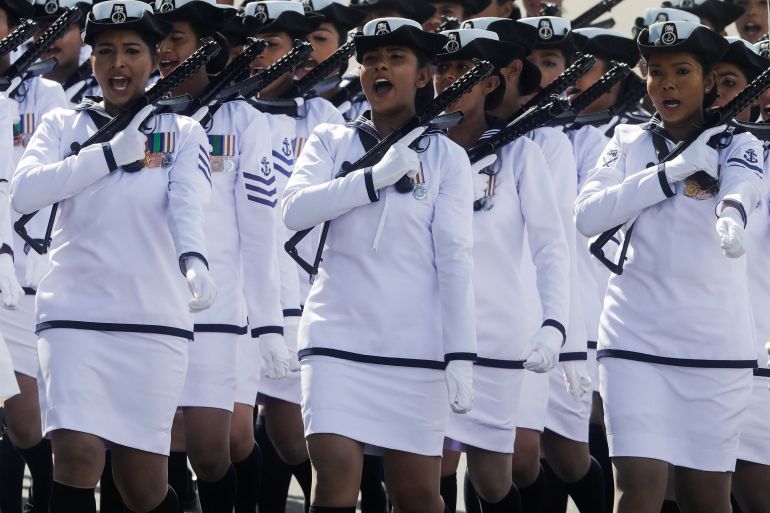Sri Lankans lament Independence Day pomp amid economic crisis
Armed troops parade in Colombo amid criticim over the event’s cost at a time of dire economic crisis.

Sri Lankans have protested in the capital Colombo against the government’s decision to organise a pompous military parade to mark 75 years of independence from British colonial rule at a time when the country is experiencing a dire economic crisis.
The celebration on Saturday was condemned by many Buddhists and Christian clergies who announced a boycott of the event in Colombo, while activists and others expressed anger at what they regard as a waste of money.
Keep reading
list of 3 itemsCanada sanctions Mahinda, Gotabaya over human rights violations
‘I can’t afford my medicine’: A Sri Lankan granny’s monthly costs
Despite the criticism, armed troops paraded along the main esplanade in the city, showcasing military equipment, as navy ships sailed in the sea and helicopters and aircraft flew over the city. Sri Lanka gained independence in 1948.
“Given inflation, given increasing costs, given the way the local currency devalued … ordinary Sri Lankans are struggling to make ends meet. And at a time like this when you have a celebration that people have heard is costing so many thousands of dollars, they are not happy,” said Al Jazeera’s Minelle Fernandez.
“The president himself a few months ago did go on record about austerity measures, on the need to tighten the collective belt of the country to ensure that costs are brought down, he warned of the difficult road ahead … but at the same time, you find him saying that they have to celebrate Independence Day because people will otherwise think that the country is unable to even do that,” Fernandez added, reporting from Colombo.
Catholic priest Cyril Gamini called this year’s ceremony a “crime and waste”.
“We ask the government what independence they are going to proudly celebrate by spending a sum of 200 million rupees ($548,000),” said Gamini, adding the Catholic Church does not condone spending public money on the celebration and that no priest would attend the ceremony.
Water cannon fired on protesters
Prominent Buddhist monk Omalpe Sobitha said there was no reason to celebrate and described the ceremony as just an exhibition of weapons made in other countries.
A group of activists began a silent protest on Friday in the capital, condemning the government’s independence celebrations and failure to ease the economic burden. A video posted on social media showed the group being surrounded by police who later tried to disperse the crowd by using a water cannon.
Al Jazeera was not able to independently verify the video.
Sri Lanka is effectively bankrupt and has suspended repayment of nearly $7bn in foreign debt due this year pending the outcome of talks with the International Monetary Fund.
The country’s total foreign debt exceeds $51bn, of which $28bn has to be repaid by 2027. Unsustainable debt and a severe balance of payment crisis, on top of lingering difficulties from the COVID-19 pandemic, have led to a severe shortage of essentials such as fuel, medicine and food.
On Friday the United Nations children’s agency reported that nearly a third of Sri Lankans required humanitarian assistance as a result of the downturn.
The military parade on Saturday took place on the same boulevard that last year was the site of a protest encampment erected by Sri Lankans outraged over the island’s economic calamity and mismanagement by its leaders.
The protest movement peaked in July when a huge crowd stormed the home of President Ranil Wickremesinghe’s predecessor, Gotabaya Rajapaksa, and chased him into temporary exile, from where he issued his resignation.
Wickremesinghe ordered security forces to dismantle the camp, hours after he was sworn into office and has since set about repairing Sri Lanka’s ruined finances.
His government has increased taxes and is negotiating with international creditors including India and China to clear the way for an urgently needed International Monetary Fund bailout.
To manage the country’s expenses, the government has also announced a 6 percent cut in funds allocated to every ministry this year. Also, the military, which had swelled to more than 200,000 members amid a long civil war, will be downsized by nearly half by 2030.